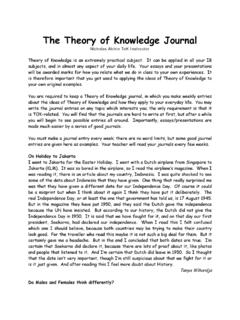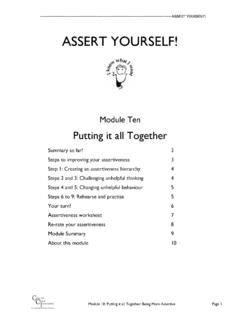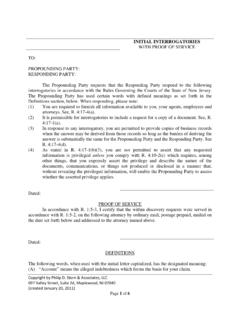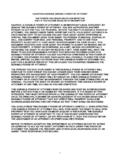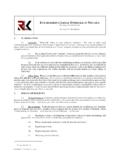Transcription of A Simple Foolproof Method for Writing …
1 A Simple Foolproof Method for Writing philosophy Papers From About philosophy by Robert Paul Woolf, Prentice-Hall, 1975. A philosophy paper is a defense of a thesis, in which the thesis is explained and analyzed, arguments are given in support of the thesis, possible objections to the thesis are stated and examined, and responses are given to the objections. A philosophy paper thus has five parts: 1. The statement of the thesis 2. The analysis and explanation of the thesis 3. The arguments in support of the thesis 4. The examination of objection to the thesis 5. The response to the objections The simplest and most Foolproof way to write a philosophy paper is to organize it in precisely this order: Thesis, Analysis of Thesis, Arguments for Thesis, Objections to Thesis, and Response to Objections. It isn't necessary to stick to this order, of course, and after you get good at Writing philosophy papers, you may want to experiment with other system of organization.
2 But if you have never written a philosophy paper before, and you aren't really quite sure what you are doing, it might be a good;' idea to stick to this structure. It can't lose! Let's take a close look at each of these five elements in turn. 1. The Thesis : A philosophy paper is a defense of a thesis, so the first step is to get clear what a thesis is. A thesis is a statement that makes some clear, definite assertion about the subject under discussion. For example, if the topic of your paper, the subject under discussion, is the morality of abortion, here are some of the many theses you might choose to defend: Abortion is morally wrong under all circumstances. A woman has an absolute right to decide whether to have an abortion. Abortion is morally right only to save the life of the mother. Each of these is a clear, definite statement that takes a position on the morality of abortion, a position that the rest of the paper will attempt to defend.
3 Let's try another example. Suppose that the subject under discussion is the existence of a Supreme Being. Among the theses you might choose to defend are these: There is no God but Allah. It is logically impossible for there to be a Supreme Being. Human beings are incapable of determining whether there is a Supreme Being Now let's look at some examples of things that look like theses, but aren't: The scientific status of astrology Abortion, pro and con Why I believe in God These aren't theses because they don't assert anything. All three of these are what we might call topics. You can certainly write a philosophy paper about one of these topics, but you must first choose a thesis about the topic, a thesis that you will defend in the paper. By the way, watch out especially for fake theses-like the third one. ("Why I. believe in God"). A philosophy paper is not a personal report of how you feel or what you believe.
4 It is an argument for a thesis. Those you who [have taken] part in formal debate team may think that all of this looks very much like a debate. You are absolutely right. philosophy is very much like debating. Whatever you do, don't pick a wishy-washy thesis that hedges your bets, like "There is much to be said on both sides of the abortion question,,' or "There are good arguments for and against the existence of God." Take a stand, plant your feet squarely on the ground, and argue for your thesis as well as you can. Since we have already used the example of the morality of abortion, let's continue to use it. For the remainder of this appendix, our thesis will be: Abortion is morally wrong under all circumstances whatsoever. 2. The Analysis and Explanation of the Thesis The first step in the defense of a thesis is to explain what you mean by it. Since we are using as an example the thesis "Abortion is morally wrong under all circumstances whatsoever," we must state exactly what we mean by the term "abortion," by the phrase "morally wrong," and by the qualifying clause "in all circumstances whatsoever.
5 ". This may seem like a trivial exercise to you, but watch out! In philosophy , a lot can get loaded into an innocent- looking definition. For example, we will want to make it clear that by "morally wrong" we mean something quite different from "against the law" or "legally wrong." It is one thing to argue that abortion, suitably defined, violates some state or federal law in the United States or elsewhere. It is quite another thing to argue that abortion is morally wrong, that it violates some principle that all persons ought to abide by. If we-are arguing about the law, we shall have to cite the criminal codes, judicial decisions, Supreme Court opinions, or law books. But if we are arguing about what is right and wrong, then we shall have to appeal to some other sorts of considerations unless we want to claim that "morally wrong" and "legally wrong" are one and the same, which would itself be a very powerful, highly debatable claim.
6 How shall we understand "in any circumstances"? Are we claiming that abortion is wrong even in cases in which the pregnancy resulted from incest or rape? Do we mean that abortion is wrong even if the fetus cannot possibly survive, and the mother will die without the abortion? Are we claiming that abortion is wrong even if prenatal testing reveals that the fetus has a fatal congenital disease and cannot survive for more than a few hours after birth? Notice: At this stage we are not arguing, we are just explaining what we mean by the thesis. And since it is our thesis, we can interpret it any way we wish. But how we interpret the thesis will shape the rest of the paper, for it will determine what sorts of arguments we give and what sorts of objections we must consider. For example, if we inexpert "in any circumstances" to mean "even if the pregnancy resulted from rape," then we will have to consider the objection that a woman should not be required against her will to risk her life.
7 But if we exclude pregnancies resulting from rape, then that isn't an objection against our position, so we don't have to consider it in this paper. You can begin to see how the paper will be shaped and determined by how we interpret our thesis. That is why explaining and analyzing the thesis is such an important step, one we must take before moving on to the arguments. For purposes of our discussion, let us agree to interpret our thesis in the following way (remember, this is just one of countless possible interpretations not in any sense the right interpretation, just the interpretation we have chosen in order to write this paper): "Abortion is morally wrong under all circumstances whatsoever" means "Terminating a human pregnancy at any stage before birth, so long as the fetus is alive, violates the objective and universal principles of Judeo-Christian morality, and is therefore wrong without exception for rape, incest, danger or the life of the mother, or any other circumstance, including even a circumstance in which the abortion might save the lives of many other innocent people.
8 ". Notice that I have interpreted "morally wrong" to mean "contrary to the objective and universal principles of Judeo- Christian morality." Needless to say, that is not the only way "morally wrong" can be interpreted. We might also have interpreted it to mean "in conflict with the Principle of Utilitarianism," or "incompatible with the Categorical Imperative." Let me repeat: You can choose any thesis you wish, and interpret it in any plausible manner you wish, so long as you make it clear to your reader what you are doing. Before moving on to the main body of your paper, which is the Argument for the Thesis, review what you have written. Make sure that you have stated a genuine thesis (not just a topic), and that you have explained clearly what that thesis means. Here, as always, you must try very hard to put yourself into the mind of your reader, and ask whether he or she will understand exactly what your thesis means.
9 Reading what you have written as your reader will read it is actually the hardest part of all Writing . You may think you know what you have in mind, but unless you put it down on paper clearly, precisely, and accurately, your reader won't have a clue. One way to check on yourself is to give what you have written to a friend and ask him or her to tell you what he or she thinks you have said. Don't give any hints, and don't argue. If your friend doesn't understand what you have written in the same way you understand it, then there is probably something wrong with what you have written. (Choose an intelligent friend!). 3. The Arguments in Support of the Thesis We have come to the heart of the paper the arguments for the thesis. This is where you show your stuff. You have got to come up with arguments that are designed to persuade your reader that your thesis is true. What is an argument? To put it as simply as possible, an argument for a thesis is a reason for believing that the thesis is true.
10 There are many different sorts of reasons you can give in support of a thesis. In the next few paragraphs, we will take a brief look at some of the most important. Just remember: When you are putting forward an argument in support of your thesis, ask yourself, "If I didn't already believe my thesis, would this reason convince me that the thesis is true? Would it at least make me more inclined to believe that it is true? Would it tend to convince a reasonable reader who is open-minded enough so that he or she is willing to listen to reasons?" If the answer is yes, then you have your hands on a genuine argument. If the answer is no, then leave it out of the paper, and look for a better argument. Let's take a look at some very Simple examples. philosophy may strike you as pretty difficult, but like many difficult things, it is made up of Simple parts. Don't try to be too fancy! Just look for straightforward arguments that tend to support your thesis.

